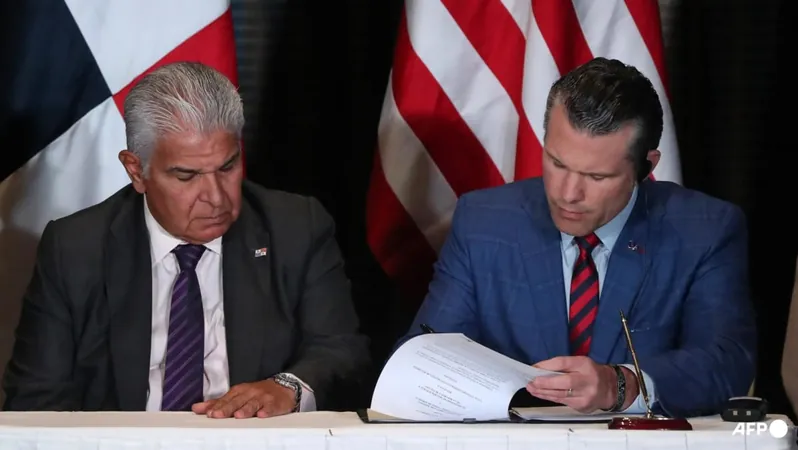
US Troops Gaining Ground: New Panama Canal Agreement
2025-04-11
Author: Yu
A Game-Changing Deal for US Military Presence
In a significant move, the United States has secured the ability to deploy troops to several bases along the Panama Canal, according to agreements revealed recently. This pivotal deal serves as a strategic win for President Donald Trump, who is eager to reassert American influence over this vital global artery.
Strategic Maneuvers Amidst Tensions
Signed by high-ranking security officials from both nations, the pact permits US military personnel to conduct training exercises and other unspecified operations at facilities controlled by Panama. However, it stops short of allowing for the establishment of permanent US bases, a prospect that would likely provoke widespread disapproval among the Panamanian populace.
A Tug of War Over Influence
Since returning to power in January, Trump has voiced concerns about China's growing clout over the canal, a route that handles around 40% of US container traffic and 5% of global trade. His administration has been clear about its desire to regain control of this strategic waterway, which the US managed until 1999.
Local Leaders Exercise Caution
Despite Trump’s ambitions, Panamanian President Jose Raul Mulino has been cautious. While on a trip to Peru, he disclosed that the US had initially sought to establish its own bases, which he deemed 'unacceptable.' He warned that such a move could ignite significant unrest in the nation.
Negotiated Concessions Benefitting Panama
The formal 'Memorandum of Understanding', which was signed recently, reflects a compromise. Notably, the US has acknowledged Panama’s sovereignty, a critical concession amid Trump’s unpredictable approach to international agreements. Panama will also have a say on any deployments, although skepticism persists about Trump's commitment to honoring these terms.
Long-Standing Challenges in US-Panama Relations
The relationship between Panama and the US is complex, marked by historical conflicts and cultural ties. The US invasion three decades ago to remove dictator Manuel Noriega remains a painful chapter, resulting in numerous casualties and devastation in the capital.
Economic Repercussions and Global Reactions
Trump's call to reclaim influence over the canal has sparked nationwide protests. While Panama operates the canal under agreements allowing access to all countries, concerns have intensified around a Hong Kong-based company that has long managed the ports at either end of the canal. Under pressure from Washington, Panama has accused the Panama Ports Company of failing to meet its contractual obligations, and a recent deal to offload 43 ports became a point of contention with China.
As the geopolitical landscape shifts, Panama stands at a crossroads, balancing its historical ties with America against pressures from powerful global interests. The world will be watching how this relationship evolves and what it means for the future of the Panama Canal.



 Brasil (PT)
Brasil (PT)
 Canada (EN)
Canada (EN)
 Chile (ES)
Chile (ES)
 Česko (CS)
Česko (CS)
 대한민국 (KO)
대한민국 (KO)
 España (ES)
España (ES)
 France (FR)
France (FR)
 Hong Kong (EN)
Hong Kong (EN)
 Italia (IT)
Italia (IT)
 日本 (JA)
日本 (JA)
 Magyarország (HU)
Magyarország (HU)
 Norge (NO)
Norge (NO)
 Polska (PL)
Polska (PL)
 Schweiz (DE)
Schweiz (DE)
 Singapore (EN)
Singapore (EN)
 Sverige (SV)
Sverige (SV)
 Suomi (FI)
Suomi (FI)
 Türkiye (TR)
Türkiye (TR)
 الإمارات العربية المتحدة (AR)
الإمارات العربية المتحدة (AR)